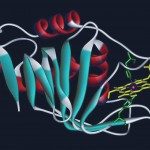Link to Pubmed [PMID] – 16761111
Apoptosis 2006 Aug;11(8):1263-73
T. annulata, an intracellular pathogenic parasite of the Aplicomplexa protozoan family infects bovine B-lymphocytes and macrophages. Parasitized cells that become transformed survive and proliferate independently of exogenous growth factors. In the present study, we used the isogenic non parasitized BL3 and parasitized TBL3 B cell lines, as a model to evaluate the contribution of two-major PI3-K- and PKA-dependent anti-apoptotic pathways in the survival of T. annulata parasitized B lymphocytes. We found that T. annulata increases PKA activity, induces over-expression of the catalytic subunit and down-regulates the pro-survival phosphorylation state of Akt/PKB. Consistent with a role of PKA activation in survival, two pharmacological inhibitors H89 and KT5720 ablate PKA-dependent survival of parasitized cells. To specifically inhibit PKA pro-survival pathways we linked the DPTsh1 peptide shuttle sequence to PKI(5-24) and we generated DPT-PKI, a cell permeable PKI. DPT-PKI specifically inhibited PKA activity in bovine cell extracts and, as expected, also inhibited the PKA-dependent survival of T. annulata parasitized TBL3 cells. Thus, parasite-dependent constitutive activation of PKA in TBL3 cells generates an anti-apoptotic pathway that can protect T. annulata-infected B cells from apoptosis. These results also indicate that DPT-PKI could be a powerful tool to inhibit PKA pathways in other cell types.

